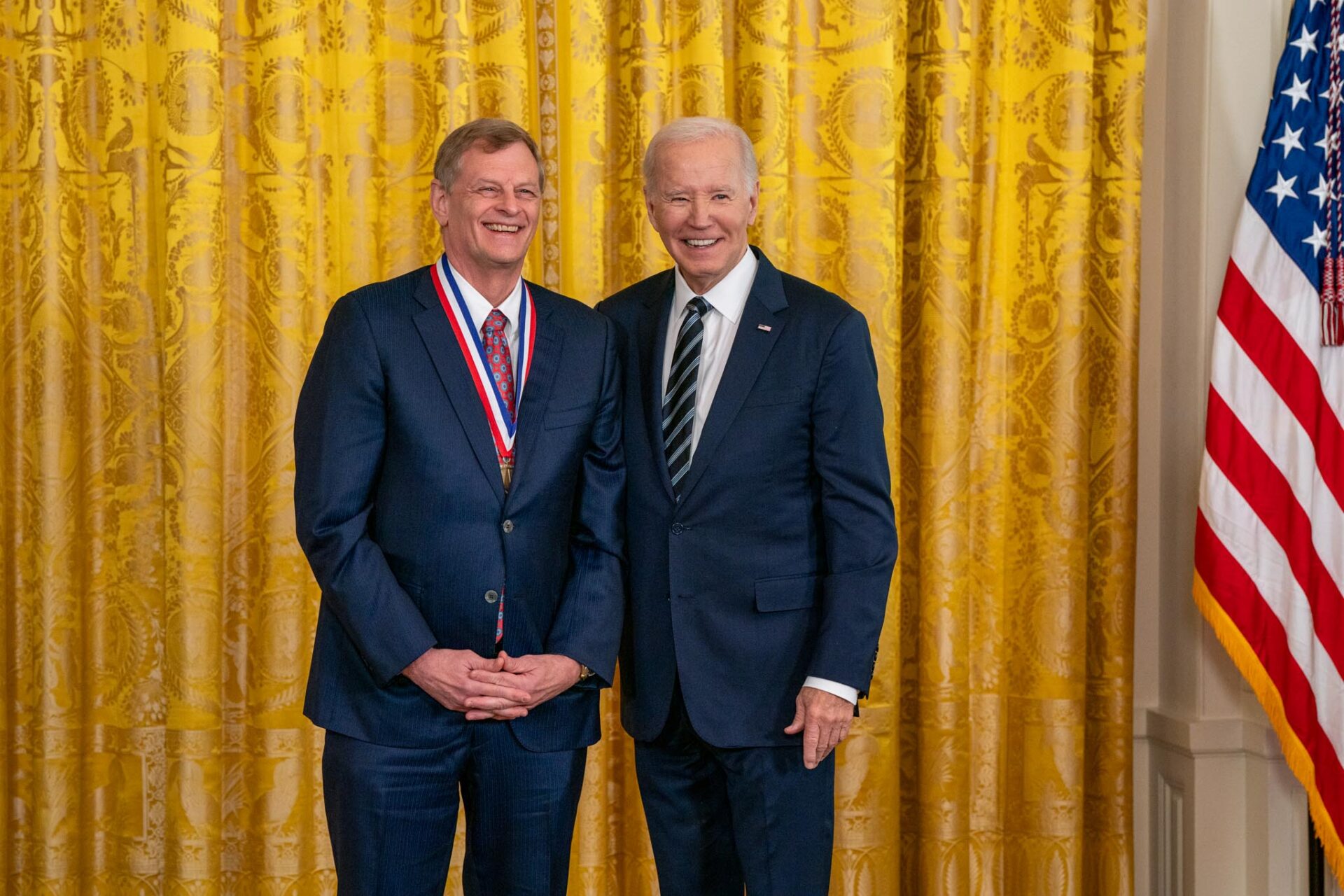President Biden awards John Cioffi the National Medal of Technology and Innovation during an awards ceremony in the East Room of the White House, Oct. 24, 2023. (Image credit: Ryan K. Morris and the National Science & Technology Medals Foundation)
In a ceremony at the White House today, President Joe Biden named John Cioffi as one of twelve recipients of the National Medal of Technology and Innovation, the nation’s highest honor for technological advancement. Biden also awarded the National Medal of Science to nine exemplary scientists for their contributions.
“President Biden often says that America can be defined by a single word: possibilities,” stated a White House press release naming the awardees. “Those who earn these awards embody the promise of America by pushing the boundaries of what is possible. These trailblazers have harnessed the power of science and technology to tackle challenging problems and deliver innovative solutions for Americans, and for communities around the world.”
Cioffi teaches graduate courses in electrical engineering at Stanford as the Hitachi America Professor in the School of Engineering, Emeritus. He began teaching at Stanford in 1986 and took a leave of absence in 1991, during which he founded Amati Communications Corporation and built the world’s first DSL modem.
“At a high but fundamental level, I’m kind of a highway paver for broadband,” Cioffi said. “My work finds ways to make cars – the information, data, video, audio, etc. – run faster and more smoothly.”
When Cioffi returned to Stanford, he continued researching ways to transmit the highest possible amount of data. In 2003, he founded Adaptive Spectrum and Signal Alignment (ASSIA), a company with over 500 patents that develops and licenses performance optimizing internet technology to telecommunications providers worldwide. He still serves as part-time CEO and chairman of the board.
Many of Cioffi’s former students went on to become colleagues and he credits his success to their contributions.
“Without all the incredible students, none of it would have been possible. They caught all my mistakes and fixed them,” Cioffi said. He has served on the board of directors for roughly a dozen companies run and/or founded by his former students.
He also expressed his gratitude for long-time Stanford advisors; his wife, Assia; and his Stanford sophomore daughter, Lorraine, who joined him at the White House to receive this prestigious award.
In 2019, Cioffi received the Women in Communications and Technology Mentoring Award, presented by the Institute of Electrical and Electronics Engineers. He was inducted to the Consumer Technology Association Hall of Fame in 2018 and the Internet Society Hall of Fame in 2014, and he is a member of both the U.S. National and U.K. Royal academies. He also serves on the board of the Marconi Society and as board chair at PHYTunes. He holds PhD and MS degrees from Stanford in electrical engineering, and a BS in electrical engineering from the University of Illinois.
Despite a growing list of accolades, Cioffi’s sights are set on the future. “Communication of information is a fundamental need today,” he said. “I am most excited about continuing to make it better – it’s a fascinating field and there is always something new to address.”
The National Medal of Science and Technology was established by the Stevenson-Wydler Technology Innovation Act of 1980 and first awarded in 1985. The Medal recognizes American innovators whose vision, intellect, creativity, and determination have strengthened America’s economy and improved our quality of life.
Additional recipients of this year’s National Medal of Science and Technology are: Mary-Dell Chilton, Syngenta Biotechnology, Inc.; Rory A. Cooper, University of Pittsburgh and U.S. Department of Veterans Affairs; Ashok Gadgil, University of California, Berkeley, and Lawrence Berkeley National Laboratory; Juan E. Gilbert, University of Florida; Charles W. Hull, 3D Systems; Jeong H. Kim, Kiswe Mobile, Inc.; Steven A. Rosenberg, National Cancer Institute; Neil Gilbert Siegel, University of Southern California; James G. Fujimoto and Eric Swanson, Massachusetts Institute of Technology; and David Huang, Oregon Health & Science University.
